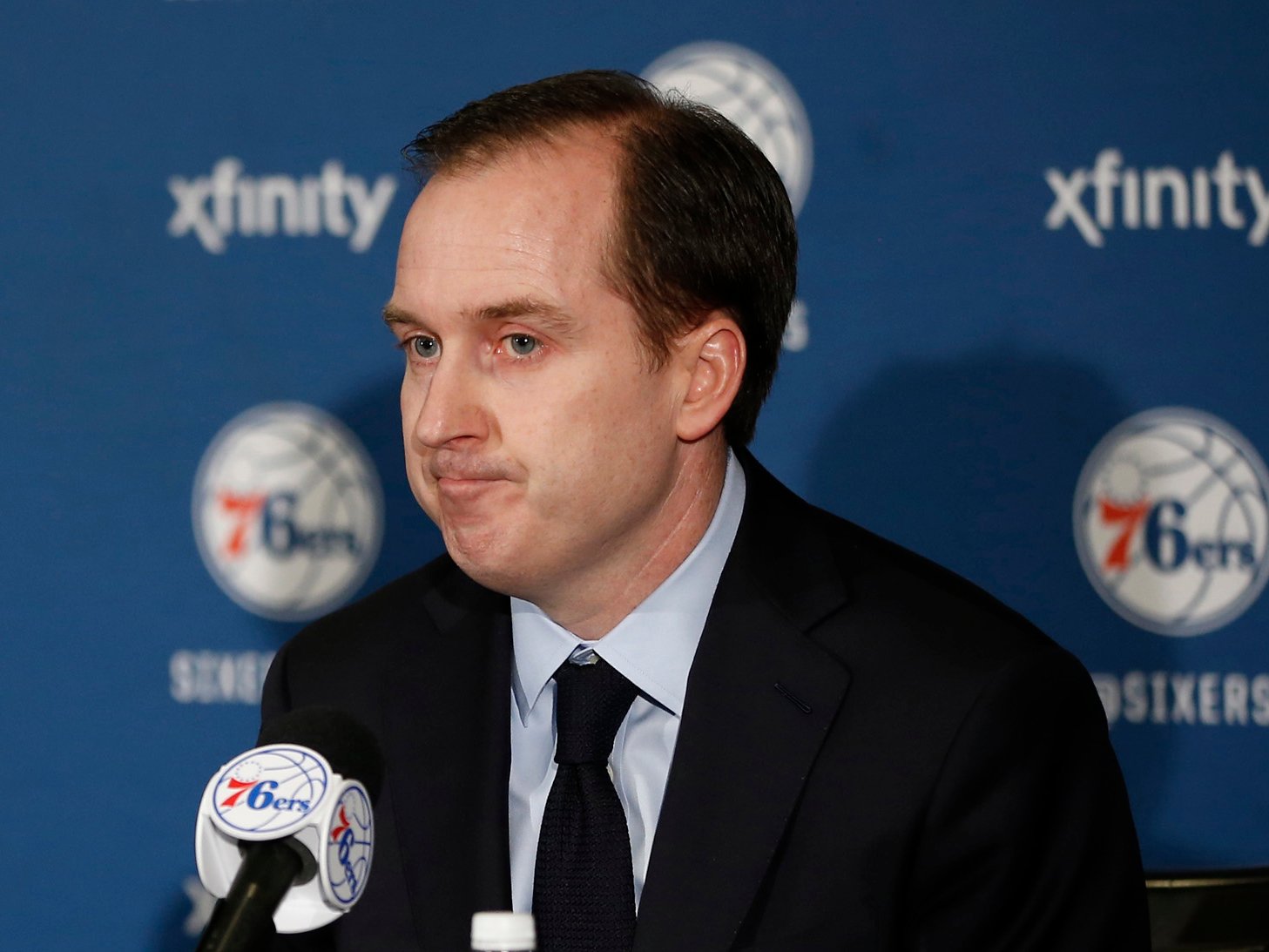 Matt Slocum/APSam Hinkie’s role was marginalized by Jerry Colangelo.
Matt Slocum/APSam Hinkie’s role was marginalized by Jerry Colangelo.When the Philadelphia 76ers brought executive Jerry Colangelo on board in December, it immediately created an awkward dynamic with GM Sam Hinkie.
Colangelo was given the title of “Special Advisor to Managing General Partner and Chairman of Basketball Operations.” That mouthful of a title put him above Hinkie, who reports indicated was General Manager “in title alone.”
On Wednesday night, it was revealed that Hinkie was officially shoved out the door, choosing to resign from his position by submitting a rambling 13-page letter to 76ers investors.
On Thursday, Yahoo’s Adrian Wojnarowski reported that Hinkie’s position with the 76ers had been marginalized by Colangelo and that Colangelo was less-than-open about collaborating with Hinkie:
From the moment Colangelo arrived on the job in December, Hinkie was doomed – no matter how hard Hinkie tried to work with Colangelo, no matter how hard he tried to accept and implement his advice. Around Hinkie, people were surprised at how optimistic he had been about finding a way to coexist with Colangelo, about working together. Others were far more cynical about how this would end – and turned out to be right.
Furthermore, Wojnarowski says that 76ers management is torn on Hinkie’s resignation and the way Colangelo treated him:
Even today, Hinkie still holds strong support with several members of the Sixers’ ownership group. They believed his plan could have harvested results this summer, sources said, and that he should’ve been afforded more time on this grand experiment.
Ownership resisted on completely abandoning Hinkie, sources said. It kept finding ways to make this work long term with Colangelo and Hinkie. … From the start, Colangelo felt that Hinkie didn’t have the necessary people skills to run an NBA organization, that he was too buried in numbers and pie graphs and PowerPoint presentations. Jerry Colangelo constantly lamented the absence of what he termed “real basketball people” in the organization.
On Tuesday, before Hinkie resigned, he appeared on ESPN’s Zach Lowe’s podcast “The Lowe Post.” When asked if he felt threatened by rumors that the 76ers were going to bring in another executive to take a position similar to Hinkie’s, Hinkie said he didn’t mind collaboration.
“Increasingly, the whole league is collaborative. The groups are bigger, the ownership groups are bigger, the coaching staffs are bigger, the management teams are bigger,” Hinkie said.
“I’d say the thing that I end up getting led to is how you make decisions and the process by which you make decisions. So, we’re always on the lookout for people that are collaborative by nature, that can have a diverse set of information flows, that have a diverse set of experiences, that can plug into a larger system, that are happy to be part of a larger decision making operation. … And everybody weighs in. … That sort of stuff I’m in for, and I’ve always been in for.”
Based on Wojnarowski’s report, that seems an indictment on Colangelo and his unwillingness to work with Hinkie.
Yet Hinkie clearly wasn’t willing to accept a significantly lesser role with the team. In his resignation letter, Hinkie told investors (emphasis our own), “Given all the changes to our organization, I no longer have the confidence that I can make good decisions on behalf of investors in the Sixers—you. So I should step down. And I have.”
Hinkie was the architect of “The Process,” and his letter tells investors that he’s never felt obligated to publicly defend his rebuilding plan. However, his letter then does that for 13 pages, citing numerous great thinkers who went outside the box and caused “disruption” in their field. Clearly, Hinkie cherished his plan, and though few people would accept a diminished role in something they constructed, it’s not hard to envision Hinkie being headstrong on his ideas.
The 76ers will now pursue another basketball executive, with Colangelo’s son, Bryan, getting strong consideration. Ultimately, Colangelo won the power struggle. Though Wojnarowski reports management wasn’t completely disenchanted with Hinkie’s plan, it appears they did little to go to bat for him and ensure he had enough say in decision.
By all measures, the 76ers seem to be done with Hinkie and his process.
NOW WATCH: KAREEM ABDUL-JABBAR: College athletes are ‘being exploited’
















